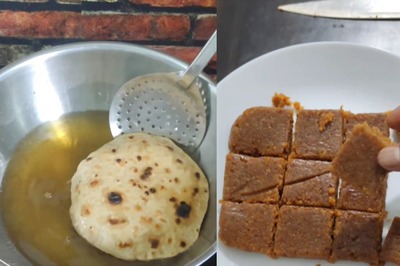
views
Bengaluru: Indian rice export prices extended losses for a second week as the rupee weakened and demand from Africa remained low, while a cyclone damaged paddy fields in neighbouring Bangladesh.
Top exporter India's 5% broken parboiled variety was quoted around $363-$368 per tonne, down from $365-$370 last week.
"In dollar terms, export prices are down due to the weak rupee. Local paddy rice prices are firm," an exporter based at Kakinada in the southern state of Andhra Pradesh said. The Indian rupee fell to a two-month low on Wednesday, increasing exporters' margins.
Tepid demand from African countries for non-basmati rice has also played a role in dampening exports, which were down 29% year-on-year in August at 644,249 tonnes.
Many rice-growing states received rainfall earlier this month, which delayed harvesting and damaged paddy crops ready for harvesting, exporters said.
Last week, cyclone Bulbul ripped through coastal areas of Bangladesh and eastern India, damaging 23,000 hectares (56,834.24 acres) of paddy fields, as per a preliminary assessment by Dhaka's agriculture ministry.
"We will get a clear picture of the extent of the damage by next week," said Mizanur Rahman, a senior official of Department of Agriculture Extension.
This could be a major blow to the country at a time when farmers have been unable to secure benchmark prices for produce, with no fresh overseas deals in sight.
Elsewhere, Thailand's benchmark 5% broken rice edged up to $395-$409 a tonne from last week's $390-$408. Demand for Thai rice has remained relatively flat despite some optimism over a recent rice deal with Iraq, traders said
However strength in the baht - Asia's best-performing currency this year - continued to dent demand for Thai rice, making it more expensive than grain from competitors such as Vietnam and India.
"Right now, domestic prices are too low for farmers," a Bangkok-based trader said. "Prices could go up as supply may shrink, or the government could step in to buy rice at a high price."
"But the current prices are already higher than our overseas competitors, so it is tough to export."
The Thai government has asked farmers in 22 rice-growing provinces not to grow off-season crops as the country braces for a dry spell amid low water levels in main reservoirs.
In Vietnam, rates for 5% broken rice stayed flat at $345-$350 a tonne. The market was dull, with trading done only on previously signed contracts, a trader said. "I think the market will stay this quiet until the end of next year."
In October, Vietnam exported around 450,000 tonnes of rice, down 5.9% against September, customs data showed.

















Comments
0 comment